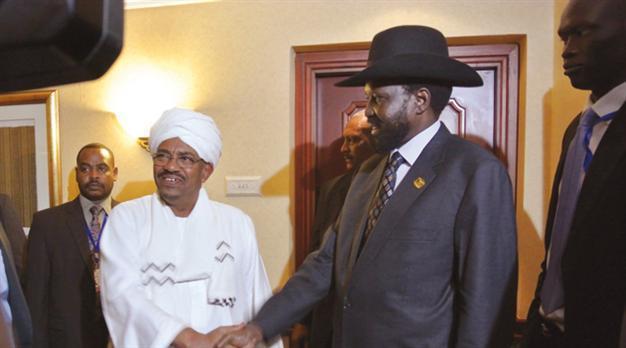Sudan and South Sudan leaders hold peace talks, shake hands
ADDIS ABABA - Agence France-Presse

Sudanese President Omar al-Bashir (Center L) shakes hands with his South Sudanese counterpart Salva Kiir (Center R) following a meeting in Addis Ababa.
The leaders of
Sudan and
South Sudan, whose countries have been on the brink of full-scale war, met on July 14 for their first private talks since the fighting.
Sudan’s Omar al-Bashir and his South Sudanese counterpart Salva Kiir met late on July 14 night at a luxury hotel and shook hands as they left the room. A member of the Sudan delegation said the two had held hour-long talks.
“They met today [July 14] and ... it was a good meeting,” chief negotiator Pagan Amum told reporters afterwards.
The two leaders, who were in the Ethiopian capital for an African Union summit, emerged from the meeting room smiling and shaking hands, according to reports. They initially met with aides present, and then met one-on-one for the remainder of the hour. The African Union’s Peace and Security Council on July 14 urged Khartoum and Juba to settle their differences on oil and border demarcation before the August 2 deadline set by the United Nations.
Amum said he was hopeful a deal could be reached by the looming deadline. “It is time for a decision,” he said.
Talks between Khartoum and Juba on unresolved issues from the 2005 peace accord resumed on Thursday in Bahar Dar in north-western Ethiopia, AU Peace and Security Commissioner Ramtane Lamamra told journalists.
“[We] urged all parties to use this opportunity to conclude agreements on all outstanding issues including security, oil and related payments [and] the status of nationals,” he said.
Talks between the two former civil war foes have been dragging on since South Sudan officially became independent from Sudan in July last year.
Violence escalated between the two countries in April, prompting the AU and the U.N. to set a three-month deadline for them to resolve outstanding disputes.
Last week, the two sides agreed to a cessation of hostilities and a commitment to pursue peace, though fell short of signing a concrete deal. Despite the recent commitment to peace, Amum accused Khartoum of fresh attacks in northern Bahr el Ghazal in recent weeks, but insisted that “we have chosen to resume whether they are bombing or not.” One of the main sticking points between the two sides has been how to share oil revenues. When South Sudan gained independence, it took with it 75 percent of the region’s oil, though processing and export facilities remained in the North. In January, Juba cut off oil production -- paralyzing both economies -- after it accused Khartoum of siphoning oil illegally.
Apart from the Sudan, other security issues were a top priority at the meeting, with leaders focusing on instability in Mali, renewed violence in the Democratic Republic of Congo. AU Commission chairman Jean Ping opened the two-day summit saying that the AU was ready to send troops to the restive eastern DR Congo as part of a peacekeeping force, where Rwanda is accused by UN experts and Kinshasa of supporting a mutiny by Congolese troops.
